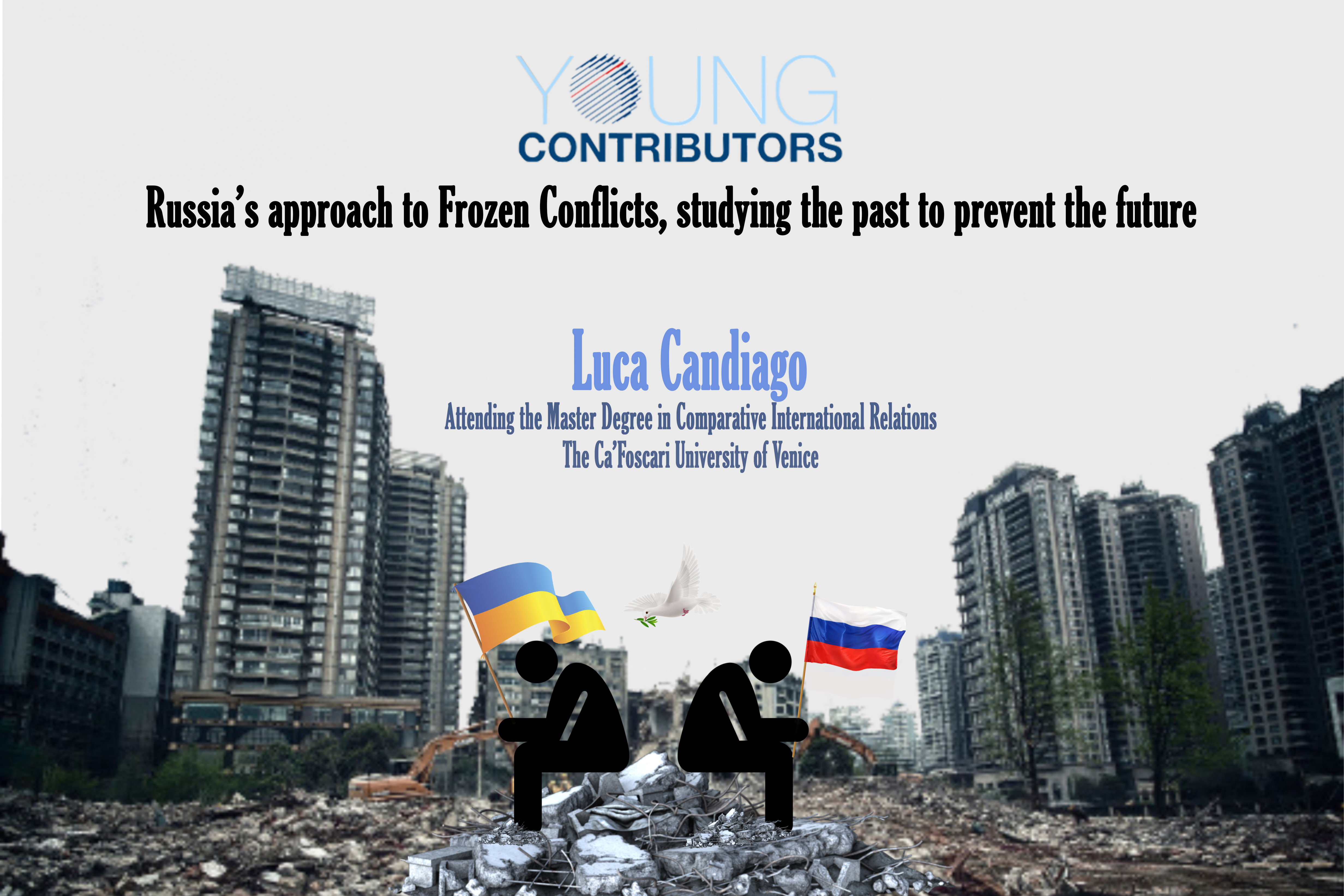Russia’s approach to Frozen Conflicts, studying the past to prevent the future
Definition of the term
A “Frozen conflict” is a situation in which active armed conflict has been brought to an end, although it might easily become a “hot” one once again. Being often a product of the Russian Foreign Policy intersts since the dissolution of the Soviet Union in 1991, the term “frozen conflict” is mostly applied for the Post-Soviet conflicts, althought not merely to territorial disputes of those regions. As a matter of fact, they typically occur in areas of a country that are no longer under the control of the central government. While disputes are doomed to stay unsolved, however, the lack of nonviolent remedies to the problem does not lead to greater armed activities. This situation weakens the central government' position, as well as inciting other states that support the separatists to intervene in their affairs, either directly or indirectly.
Frozen conflicts in the former Soviet republics' territory make developing international ties in Eastern Europe and the South Caucasus difficult. The disputed territories, moreover, usually have some common characteristics like a Russian speaking majority or minority, groups or individuals loyal to the Motherland, and Russian military bases.

The terms frozen conflict frequently refers to five specific regions. Transnistria (in Moldova), Nagorno-Karabakh (in Azerbaijan), South Ossetia and Abkhazia (both in Georgia), and Crimea and Donbass in Ukraine.
These are regions in which separatists, supported by an external State sponsor, took the role of local administrations against the willing of the incumbent State, in which the Kremlin strategy is to destabilize other post-Soviet states on their own border and extend Russian sphere of influence. Countries like Georgia, Moldova, and Ukraine are unable to pursue an autonomous foreign policy due to their lack of full authority over their regions. They're all under the control of "proto-states" entrusted with following Russian-imposed policies to prevent these states from making a rapprochement with Western political and military structures (the only exception is the situation in Nagorno-Karabakh, an interesting example of a frozen conflict without Moscow's direct involvement).
Russia’s past approach
Regarding Russia’s approach towards these de-facto states, it is important to first distinguish some terms like leadership, hegemony, and dominance.
Leadership has a positive meaning, being related with development, wealth, and advancement. It is the ability to persuade people, organizations, and institutions to achieve certain objectives that benefit both the individual and the group.
While leadership and hegemony are related, they are not, however, the same, as the first promotes collective good while hegemony creates individual good. The term 'hegemony' refers to a country's or social group's leadership or domination over others. It is, to some extent, a tool employed by people in authority to maintain their position. Creating settings in which individuals must conform to such ideas, whether they believe in them or not, is one of the most significant tactics for preserving hegemony.
Finally, dominance is defined as an individual's desire to exert control over others.
Moscow has a wide range of weapons at its disposal to influence the political, economic, social, and foreign policy paths of its neighbors, following, hence, more a hegemony strategy rather than a leadership one.
In several conflicts, Russia took steps to build a peacemaking process only when assured that it could win complete control of both the separatist region and the state to which it was formally affiliated. In the Moldova-Transnistria conflict, for example, the Russian army backed the region's citizens to protect Moldova's Russian-speaking population. The annexation of Moldova by Romania would be the main threat to Moscow's sphere of influence, with Transnistria serving as a tool for exerting political pressure on Moldovan officials to prevent the country from joining NATO and the European Union. With political and military control over the authorities in Tiraspol, Moscow maintained a peace discussion (the so-called Kozak Memorandum) in the hopes of retaining political authority over Transnistria and Moldova. Despite the failure of the Kozak Memorandum and Moldova's subsequent withdrawal from the plan, Moscow did not carry out any duties aimed at recognizing Transnistria's sovereignty or annexing the area from Moldova, indicating that it is still interested in keeping the dispute alive.
On the contrary, Kremlin's involvement in the Armenian-Azerbaijani Nagorno-Karabakh conflict is one example of Russian activity in the post-Soviet zone. Although Moscow has no plans to openly intervene in the dispute, it does support Armenia militarily to put greater pressure on the capital Erevan. Armenia was compelled to reject the Association Agreement with the European Union by the Kremlin in 2012, causing the country to join the Eurasian Union instead.
Finally, Moscow's efforts in Abkhazia and South Ossetia were of a distinct nature: first and foremost, both republics share geographical boundaries with the Russian Federation, making their political and economic integration possible. Georgia reoriented its foreign policy in a more pro-Western direction following the triumph of the Rose Revolution in 2003, eventually attempting to join NATO. Georgia's war with Abkhazia and South Ossetia peaked in August 2008, when Moscow launched a military attack aimed at preserving the two regions' sovereignty while recognizing both separatist territories as fully independent.
For Moscow, the Ukraine crisis was the apogee of a larger conflict with the West over what principles, laws, and players should control the post-Soviet states' orientation, called "near abroad" in Russia. Although Russia violated its own commitments to protect Ukraine's territorial integrity according to the Budapest Memorandum (in 1994) and the Treaty of Friendship, Cooperation, and Partnership (in 1997), Moscow's assertion of its right to intervene in Ukraine was justified precisely because it believes it has a "privileged sphere of influence" in the post-Soviet space.
Russia uses extra soft power levers over post-Soviet republics to supplement its use of regional organizations. Energy relations, loan agreements, and migratory status are the key instruments of Moscow's influence. These issues are at the heart of many of the Kremlin's bilateral foreign relations, but they also serve as important bargaining chips in Moscow's efforts to compel post-Soviet states to follow its leadership within organizations like the Eurasian Economic Union and Collective Security Treaty Organization, as well as using bilateral soft power instruments to persuade them to join and follow its leadership priorities. In the security domain, the CSTO includes Russia, Armenia, Belarus, Kazakhstan, Kyrgyzstan, and Tajikistan, while the EEU comprises Russia, Armenia, Belarus, Kazakhstan, and Kyrgyzstan. Furthermore, in 2009, the CSTO established a Collective Operational Reaction Forces, loosely modeled after NATO's Response Force, with the goal of fast mobilizing against transnational threats while also maintaining a peacekeeping capability. Yet, when it comes to ensuring security for its members, the CSTO has shown to be ineffective.
Also, Moscow actively opposes Western actors, their liberal principles, institutions, and standards by shielding post-Soviet governments from foreign scrutiny and encouraging anti-Western sentiment. These include concepts such as "civilizational variety" (embodied in the Shanghai Cooperation Organization’s charter), the primacy of sovereignty, security in the fight against extremism, and a return to "traditional values" in reaction to the West's moral crisis.
The West's support of democracy and human rights in Russia and the rest of the post-Soviet sphere is perhaps Moscow's most important target. Following the mid-2000s color revolutions in Georgia (2003), Ukraine (2004–2005), and Kyrgyzstan (2005), which swept leaders from power and replaced them with actors more eager to align with the West, as well as anti-regime protests in Russia in 2012, Western calls for greater political liberalization went from being seen as political annoyances to a matter of national security.
Western response to the present situation
The actual situation in Ukraine, following the ideology and the strategies applied up to now by Russia, was somehow expected, although not at a so aggressive scale. It might be seen as the culmination of Moscow’s fear of losing important territories, perceived as belonging not only to a past, but to an eternal project that aims at reuniting them back together.
Western countries should consider wisely their next moves towards relevant countries for Russia. It might be argued, in fact, that the escalation of aggressiveness undertaken by President Vladimir Putin has been caused by a fear of the outcomes of several major military trainings and expansions conducted by NATO forces. Knowing the strategical importance given from the Kremlin to countries like Georgia and Ukraine, there must be more consciousness in the approach.
It is now time to think of the best possible solution for the ongoing conflict. There are three possible ways that are discussed nowadays. The first one is to keep supporting the Ukrainian faction with armaments while endorsing the sanctions, hoping that internal pressures from oligarchs, companies, as well as Russian population itself, will convince President Putin to withdraw it troops or at least to start negotiating in a more open way.
The second options, which is however hard to happen considering the support that Western countries always give to States that try to engage into a type of liberal/democratic state, would be to stop sending weapons to Ukraine and leave it contrast the invasion by her own forces. The problem, however, is that, given the declarations of President Putin, Russia would not be any more satisfied with the control over just the independentist Republics of Crimea and Donbass, it will try to take control over the entire Country.
The last options, probably the least unlikely to happen, would be to follow the request of Ukraine to close the fly zone. That would be, nevertheless, taken from the Kremlin as a direct declaration of war from the NATO and EU member countries, and the menace of a Third World War would be very likely to happen.
Essentially, the only thing that is clear to everybody, is that this war needs to stop as soon as possible. It does not seem as clear, however, how to make it stop in a way that satisfies at least to some extent both Russians and Ukrainians requests.
To conclude, the fall of the Soviet Union altered the landscape of a continent. Where a superpower once projected control across the globe, a far weaker power is now attempting to preserve and maintain the influence it can.
Russia's principal geopolitical goal will undoubtedly be to consolidate its dominance in the region. Moscow’s major tool has been preventing countries from the former Soviet bloc to build international links, ensuring the safety of the Kremlin and of its foreign policy. It's major purpose, as it appears, is to stymie those governments' Euro-Atlantic ambitions while prolonging the current unstable scenario, as neither the North Atlantic Alliance nor the European Union will admit countries that are unable to seize full control of their territories.
Russia has moreover ensured that governments that refuse to join the Eurasian sphere and become reliant on Russia's activities are engulfed in conflicts that will keep them isolated from Western powers for the foreseeable future. The question is whether it can do so without alienating its remaining supporters and jeopardizing the wall it is attempting to construct, although the modern prospects aren’t in favor of this hypothesis.
Considering the current situation, what does seem clear is that the notion of a post-Soviet sphere is gradually losing its relevance.

 Author:
Author:





